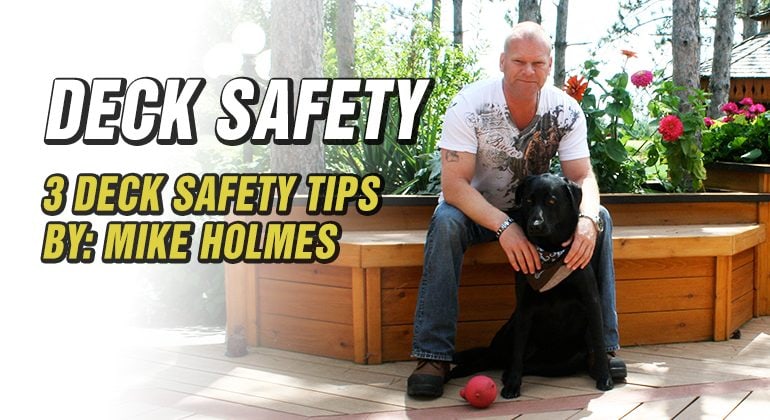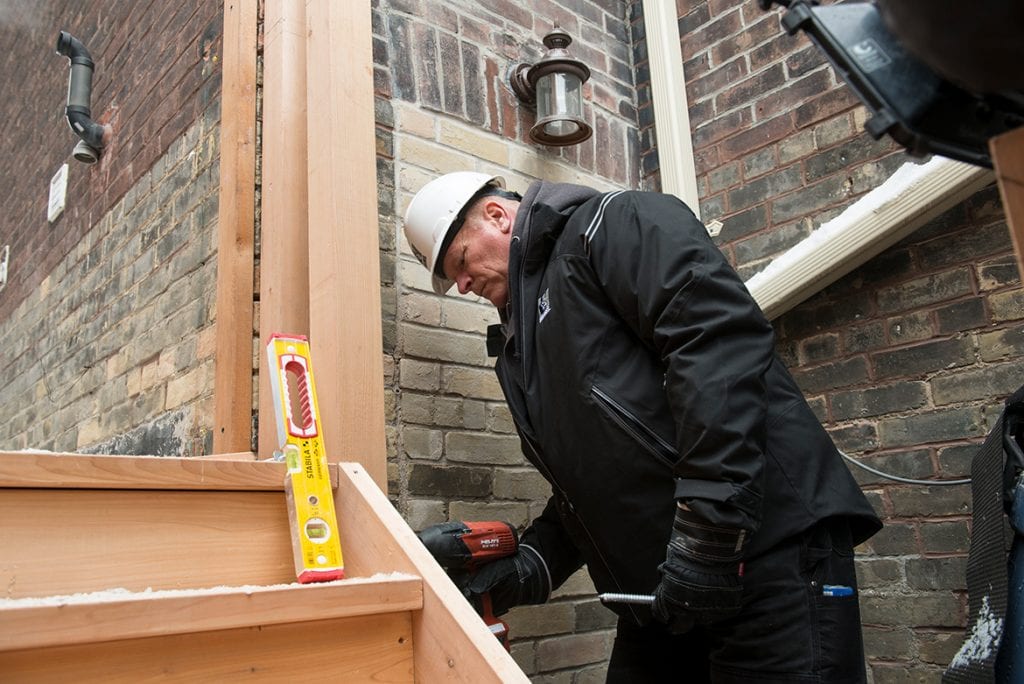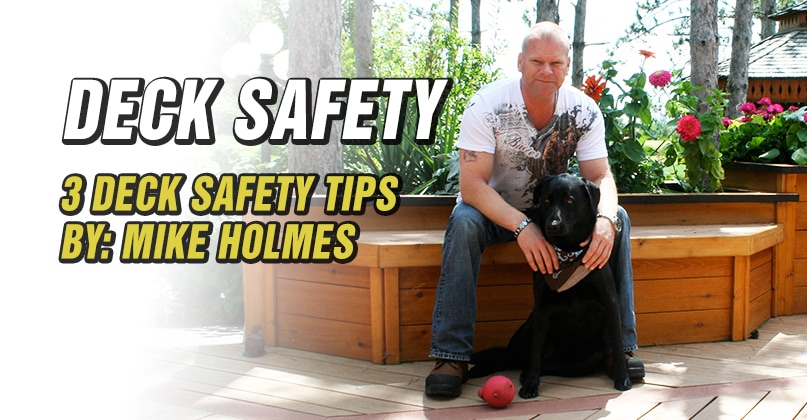In celebration of Women in Construction Week, I thought I’d share my construction journey. People often assume I was born knowing I’d work in construction. When your last name is...

3 Deck Safety Tips
By Mike Holmes
Mike’s Advice / Outdoor Renovations
Tuesday, April 23rd, 2019 @ 3:05pm
Summer is almost here, and summer is the season of outdoor projects. That usually means contractors or homeowners taking on building outdoor projects—typically decks.
Build Your Own Deck?
The deck a very common DIY project. But it’s also the one that can do damage to your home and lead to safety issues. A lot of TV shows and videos inspire people to build their own decks, but a lot can go wrong if you attempt your own deck building project.
There are many things that can—and do—go wrong with decks. The footings, the lack of permits, the height, the type of wood used, the clearance from property lines just off the top of my head. But to my mind the real challenge with decks comes when they are attached to your home.
Read more about why DIY TV shouldn’t be your source of research.
Hire The Right Deck Contractor
I know I always say this but hire an experienced professional to build your deck, and make sure you do your research before hiring a contractor. They’ll have seen the kind of damage that occurs when people do it wrong the first time—because they’ve spent years fixing those problems. A lot of contractors start out in the business building decks and fences—make sure the company you hire know what they are doing. Check references and get lots of quotes. And get a permit. If your deck is attached to your home you will need one.
Deck Safety
A deck attached to a house is a structural component, meaning it handles or undergoes “load”, and is also exposed to the elements. People often think that just because they can have 50 people in their house at one time, they can have 50 people on their decks as well. But your house’s structural components are protected from Mother Nature and designed to keep water, pests and sunlight out of your house. Your deck’s structural components are exposed to the weather, and over time may become compromised.

That’s why you need to inspect your deck every single year
Inspect Your Deck
You can hire a home inspector to come in and do a deck inspection, or you can check some main parts of your deck to ensure safety.
Monitoring your deck from a safety perspective is not top of mind for many homeowners today, but it absolutely needs to be. Think about these factors when assessing the safety of your deck.
- Is your deck safely and properly attached to your house? Your deck needs to be attached in a way that won’t cause water infiltration and damage. This kind of water infiltration can lead to your having to replace doors, windows, finished flooring, sub flooring, sheathing, structure—everything—in the area where water has crept in.
Remember:
When we talk about a deck being attached, we don’t mean that it is literally attached directly to your house’s exterior wall. The deck needs to be connected to and built off of a ledger board, which is attached to the wall.
- Is Your Ledger Board securely bolted?
That ledger board, which runs the entire length of the deck, needs to be securely bolted to the house, and I mean bolted. Never nailed. A deck will have to support a lot of weight—furniture, BBQ, people–this is not the job for nails, or even screws, which do not have the shear strength for this job. Make sure those bolts run into solid structure—not just into the exterior sheathing.
Rotting ledger boards are one of the main reasons for deck failures. If there is any visible rot on the ledger board you can be sure that it’s been compromised at a higher level than what you might think.
When inspecting your ledger board, make sure you:
✔️Check for visible rot on the ledger board.
✔️Check for dry rot by taking a screwdriver and tapping it with a hammer around the area where the joists attach to the ledger board. You can tell if there is rot if the screwdriver sinks into the wood.
✔️Make sure there are enough fasteners holding the ledger board in place
✔️Check to ensure your ledger board is bolted to the house (instead of being secured by nails). Nails can easily come out and don’t have the same strength as specialty fasteners.
Watch the video below to see Mike’s new deck and the progress from start to finish!
Watch the full series clicking the button below!
- Is moisture seeping in through your deck?
Sometimes the cause of a wet basement isn’t a foundation problem—it’s from water finding its way inside from the deck. Every time snow piles up on your deck, moisture will gather there. Over time, that area of your deck will rot.
That is a recipe for disaster if it gives way when there is weight on your deck. And let’s face it—that weight is usually the weight of people, your family and friends, gathering together to enjoy themselves on your deck. You don’t want that to happen to them. I don’t know how many times I’ve heard stories of deck disasters, caused by rotted out ledger boards or nails shearing off and allowing the deck to fall away from the house.
Did You Know:
Keep the ledger board area free from clutter during the winter so you can easily remove any snow from this area. DO NOT let snow build up on the deck next to the house. The harsh freeze/thaw conditions during the winter allow water to get in between the ledger board and the house, which can cause fasteners to rust and become loose.
The Problem Area for Decks
The area where most decks have problems is where the ledger board is attached to the house wall. Even if your contractor gets it right generally speaking, there can still be a lot of damage caused when water is able to get in behind the ledger board and enter your home. You need to make sure each and every bolt is caulked and sealed. And that ledger board has to be properly flashed to prevent water penetration.
If you have ensured the safety of your deck and ready to host that big summer BBQ, the next thing to think about is your landscaping. Read my tips on how landscaping can affect your home.










